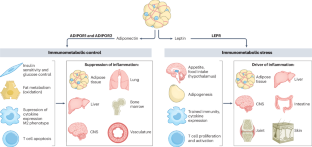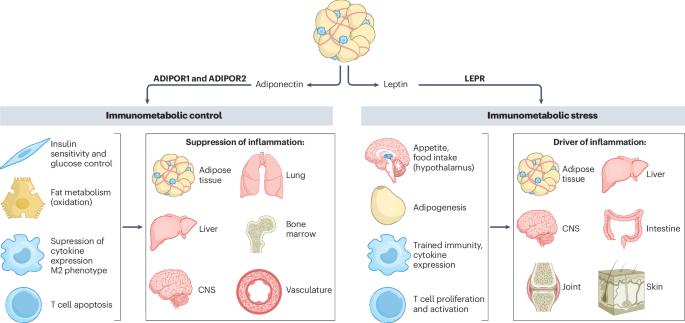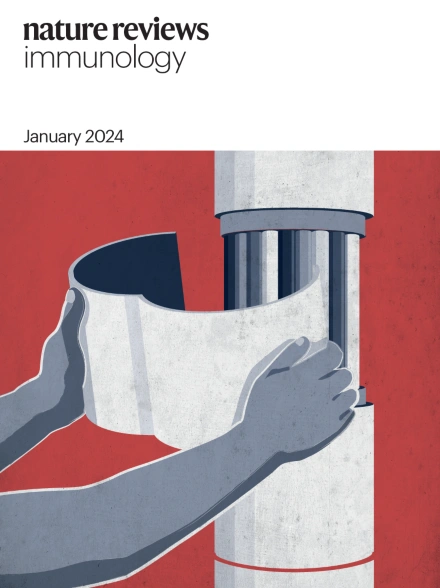Adipokines: masterminds of metabolic inflammation
IF 67.7
1区 医学
Q1 IMMUNOLOGY
引用次数: 0
Abstract
Adipose tissue is an immunologically active organ that controls host physiology, partly through the release of mediators termed adipokines. In obesity, adipocytes and infiltrating leukocytes produce adipokines, which include the hormones adiponectin and leptin and cytokines such as tumour necrosis factor and IL-1β. These adipokines orchestrate immune responses that are collectively referred to as metabolic inflammation. Consequently, metabolic inflammation characterizes metabolic disorders and promotes distinct disease aspects, such as insulin resistance, metabolic dysfunction-associated liver disease and cardiovascular complications. In this unifying concept, adipokines participate in the immunological cross-talk that occurs between metabolically active organs in metabolic diseases, highlighting the fundamental role of adipokines in obesity and their potential for therapeutic intervention. Here, we summarize how adipokines shape metabolic inflammation in mice and humans, focusing on their contribution to metabolic disorders in the setting of obesity and discussing their value as therapeutic targets. This Review discusses how adipose tissue can regulate host immune function via the release of adipokines, including adiponectin, leptin and various cytokines. These adipokines contribute to immune responses and metabolic inflammation and can have both beneficial and detrimental effects on host physiology. In obesity, adipokine release can promote insulin resistance and cardiovascular diseases; as such, there is interest in targeting these mediators for therapy of various metabolic disorders.



脂肪因子:代谢炎症的主谋
脂肪组织是一个免疫活跃的器官,部分通过释放称为脂肪因子的介质来控制宿主的生理机能。肥胖症患者的脂肪细胞和浸润的白细胞会产生脂肪因子,其中包括荷尔蒙 "脂肪连素 "和 "瘦素 "以及细胞因子,如肿瘤坏死因子和 IL-1β。这些脂肪因子可协调免疫反应,统称为代谢炎症。因此,代谢性炎症是代谢紊乱的特征,会引发不同的疾病,如胰岛素抵抗、代谢功能障碍相关肝病和心血管并发症。在这一统一的概念中,脂肪因子参与了代谢性疾病中代谢活跃器官之间发生的免疫学交叉对话,突出了脂肪因子在肥胖症中的基本作用及其治疗干预的潜力。在此,我们总结了脂肪因子如何影响小鼠和人类的代谢性炎症,重点探讨了它们在肥胖症中对代谢紊乱的贡献,并讨论了它们作为治疗靶点的价值。
本文章由计算机程序翻译,如有差异,请以英文原文为准。
求助全文
约1分钟内获得全文
求助全文
来源期刊

Nature Reviews Immunology
医学-免疫学
CiteScore
93.40
自引率
0.40%
发文量
131
审稿时长
6-12 weeks
期刊介绍:
Nature Reviews Immunology is a journal that provides comprehensive coverage of all areas of immunology, including fundamental mechanisms and applied aspects. It has two international standard serial numbers (ISSN): 1474-1733 for print and 1474-1741 for online. In addition to review articles, the journal also features recent developments and new primary papers in the field, as well as reflections on influential people, papers, and events in the development of immunology. The subjects covered by Nature Reviews Immunology include allergy and asthma, autoimmunity, antigen processing and presentation, apoptosis and cell death, chemokines and chemokine receptors, cytokines and cytokine receptors, development and function of cells of the immune system, haematopoiesis, infection and immunity, immunotherapy, innate immunity, mucosal immunology and the microbiota, regulation of the immune response, signalling in the immune system, transplantation, tumour immunology and immunotherapy, and vaccine development.
 求助内容:
求助内容: 应助结果提醒方式:
应助结果提醒方式:


